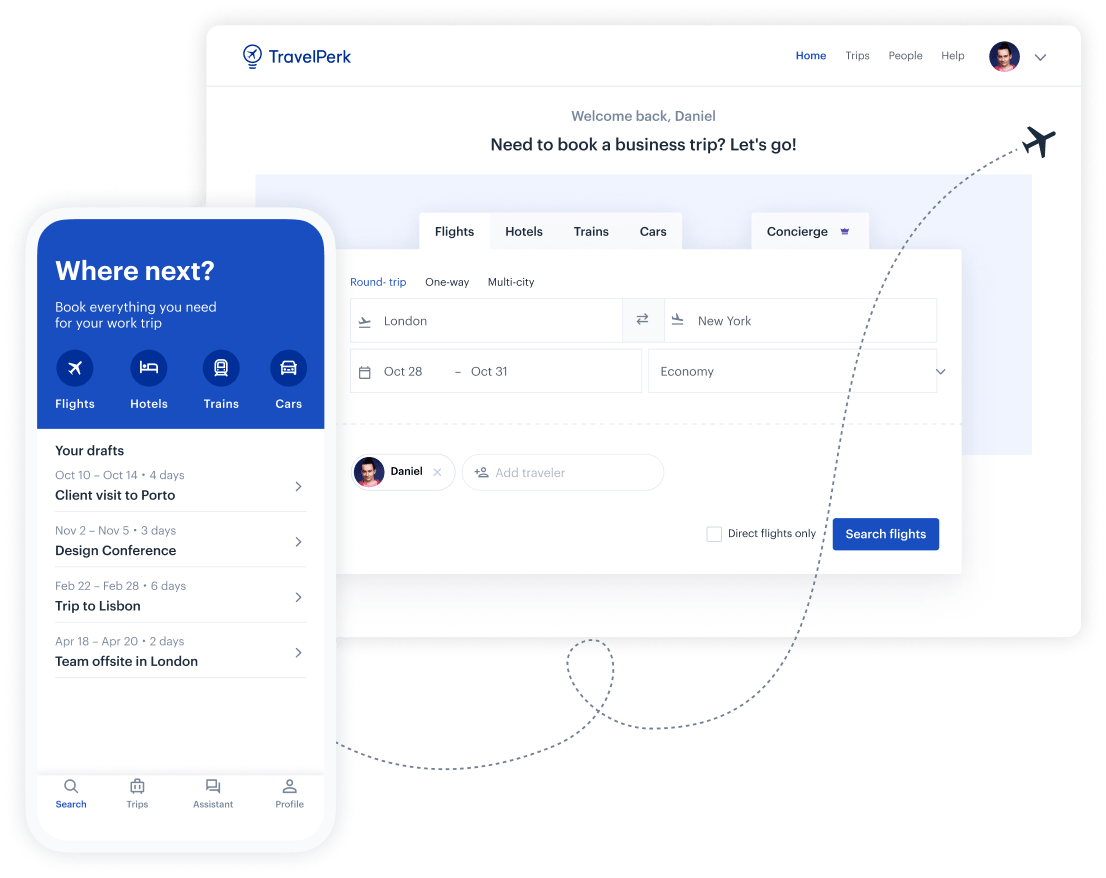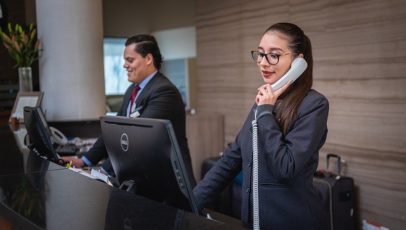75% of millennials prefer spending their money on an experience rather than accumulating more possessions. Businesses are using this fact to their advantage by crafting corporate travel incentive programs to get the best from their teams. But what exactly is a travel incentive program, and how can a company use one to grow their business?
What strategies do companies employ when it comes to business travel incentive programs?
There are no hard and fast rules when it comes to choosing corporate travel incentives. The key to a successful program is to think about what will drive your team to success. An organization's management team needs to decide what is within their budget and what incentives will work best within their business.
On the whole, organizations tend to choose group incentive travel for their top performers. However, there are exceptions. For example, a company with predominantly traveling sales teams might opt for individual travel offering a luxury trip for their top salesperson.
After all, most employees who work solo wouldn't find it much of a reward to spend time with colleagues they don't know. They would likely find the chance to win an all-expenses-paid trip with their significant other more motivating. It simply comes down to the nuance of each business.

Some companies extend their corporate travel incentives to VIP clients who bring in a certain level of business. Some maintain a strict employees only policy on their trips, while others allow partners to join. As we alluded to earlier, there are no set rules. It simply comes down to the nuance of each business. For the program to be effective, the reward needs to have substantial appeal to its intended audience. Management will need time to reflect on the program's intended business objectives and what makes their team tick.
The return on investment for travel incentives is multifaceted. Most programs have a critical financial or customer-related metric at their core. But as we will shortly see, there are a host of other less tangible benefits to choosing travel rewards over a cash bonus system. When planning your program and the nature of the prize, it's vital that you keep these less apparent benefits in mind.
Too often, companies combine incentive getaways with AGM's, other corporate events, or patronizing team-building exercises to justify the cost. But this approach reduces the rewards element of the trip and can result in losing the motivational aspect that is the program's true purpose. The best trips combine subtle opportunities for teams to bond and share experiences but allow employees to relax and celebrate their achievements.
Why are travel incentives more impactful?
Sadly the excitement of a cash bonus quickly fades. It goes into savings and gets tangled up with day-to-day life, like paying bills or working off student loans. By comparison, a travel incentive feels special. There is more anticipation than can be achieved by spending money in a store. Plus, after coming home with many wonderful memories, winners feel a deepened loyalty towards their company and a renewed commitment to hit targets again! In addition, as humans, we crave connection and hate the idea of being left out!
FOMO can be a great motivator as employees will naturally want to join in on the excitement of a getaway. As much as teams might appreciate a financial uplift, it will not have the same impact and ROI as travel rewards. They will remember the fantastic trip to Hawaii years down the line but won't necessarily recall how they paid for the watch they love.
While a cash reward is always appreciated, people tend to be private about their finances, especially amongst their colleagues. Often there is a lack of transparency around bonuses. In the worst-case, team members can suspect colleagues are unfairly receiving a higher figure than they are. Travel incentive programs cut through the office politics that frequently surrounds cash bonuses.
Working towards a common goal can unite a previously fractured team or motivate junior team members to reach out and learn from experienced colleagues.
What benefits do corporate travel incentive programs bring?
They increase motivation and collaboration.
Travel incentives are a remarkable display of employee recognition and offer staff well-deserved credit for their hard work. As well as boosting employee motivation, they can inspire and foster idea-sharing as others want to emulate the success of top performers. Impressive incentives also can improve communication and collaboration as teams come together to take home the prize!
Great incentives lead to higher job satisfaction and employee retention.
It's essential to our sense of purpose to have targets to aim at and acknowledgment of our efforts. It can stop our work feeling repetitive and lead to greater satisfaction towards our role within a company. Linking targets to a fabulous prize is a tangible way to show appreciation for your staff's hard work and is a perk they will be reluctant to leave behind.
Envy-inducing perks make it easier to attract quality candidates.
When scoping out a new opportunity, savvy candidates will eagerly check out the benefits of choosing your company over a competitor. In the age of social media and sites like Glassdoor, there are many opportunities for a potential candidate to weigh up your organization's company culture. Sharing inspiring images from your corporate travel incentives is a sure-fire way to catch the attention of quality candidates.
They give you a competitive edge.
With an incentive travel program, managers have a new method to measure their team's productivity. Maybe a team will hit their target earlier than last year to ensure they secure their spot on the getaway, creating a host of new statistics to impress current and potential clients alike. An ambitious company is always appealing. Seeing your team's hunger for success is infectious and might tip the scales in your favor!

How can an organization establish an effective business travel incentive program?
A corporate travel incentive can foster healthy competition if handled correctly, but it can breed discontent if poorly managed. Administrative teams can feel overlooked if they don't have a shot at the prize, or newer employees might feel disheartened if they see the same faces selected each year. However, there are clear steps you can take to ensure you craft a successful corporate travel incentive program!
Five-step checklist for creating a successful corporate travel incentive program.
- Decide on your metrics and motivators.
- Plan a grand prize that will excite your team!
- Incorporate into your company culture by marking major milestones.
- Assign hosts and capture the highlights so you can build excitement next year!
- Collect feedback from your winners. Analyze alternative targets you could measure and adapt for a new destination for the next cycle!
1. Choose clear metrics.
As you set about outlining your incentive program, it's crucial to choose a clear metric to act as your target. Financial benchmarks, such as the net value of new sales, are often the most straightforward. These metrics are easier to measure, they have clear goals to hit, but they tend to focus solely on sales teams and run the risk of neglecting other equally valuable staff members.
Selecting a mix of sales incentives and customer service-related targets can be a way to ensure a broader level of employee engagement, show appreciation across the board and keep everyone motivated year-round.
2. Design a memorable incentive trip!
When going through the planning process for your reward trip, you will want to filter in as many memorable experiences and opportunities for the group to bond as you can. Activities that everyone can enjoy are best or offer a couple of options to avoid creating awkwardness. You don't want to make people anxious with an enforced ziplining trip when the goal is to make them feel appreciated.
Also, try and avoid highly organized team-building activities that might be better suited to an AGM or corporate meeting. Opt instead for activities that highlight the incredible destination, such as a cookery class, where participants can work together to create a delicious local dish! You don't need to hire an event planner or a travel agency to shape a great employee incentive trip.
Using a service like TravelPerk can allow you to handle all your travel management in-house and save you money. Our group travel service can remove the stress of juggling multiple travelers' arrangements. We negotiate the best group rates and handle any changes you need along the way. Each traveler has access to our 24-hour customer service line, where a team of real human beings is on hand to answer any questions. Plus, our concierge team can help suggest once-in-a-lifetime activities or book pre-paid restaurants for your stay, and you can save up to 25% with our VAT recovery reports.
3. Make a moment out of the milestones!
The key to building anticipation around your incentive program is to keep your employees updated. Keep giving your program importance with regular notifications in team meetings and a starring role at your AGM! Share images of last year's winners as you announce a new destination!
Reveal details from the itinerary as teams reach specific markers to build anticipation and stoke their competitive fires! Marking these milestones can help incorporate your incentive policy into your company culture and get employees genuinely excited about this perk!
4. Assign hosts for the trip.
Having a member of the management team act as a host for the trip is beneficial for various reasons. Having a trusted person on-site to ensure all arrangements run smoothly is crucial, but also they can make sure there is a record of the trip!
Capturing all the highlights in photos and short videos can be a fantastic resource for HR teams and for building excitement for the next round of the program. With their insider knowledge, the host can also get people networking outside their silos by pairing up members from different teams for activities.
5. Establish space for feedback.
A corporate incentive travel program is only successful if the team has an amazing travel experience. You want your travelers to come back refreshed and raving about the fantastic time they had so that others can feel inspired to make the list next year.
There is bound to be an element of the trip that someone doesn't like, but you need to know if you missed the mark on a broader scale. After analyzing the feedback and assessing alternative metrics you could measure, you will be in a solid position to tweak the program next year!

Did you find this article useful?
If you did, please follow us on our social media accounts on LinkedIn or Instagram. Please share the article with your friends or colleagues!

Make business travel simpler. Forever.
-
See our platform in action. Trusted by thousands of companies worldwide, TravelPerk makes business travel simpler to manage with more flexibility, full control of spending with easy reporting, and options to offset your carbon footprint.
-
Find hundreds of resources on all things business travel, from tips on traveling more sustainably, to advice on setting up a business travel policy, and managing your expenses. Our latest e-books and blog posts have you covered.
-
Never miss another update. Stay in touch with us on social for the latest product releases, upcoming events, and articles fresh off the press.


